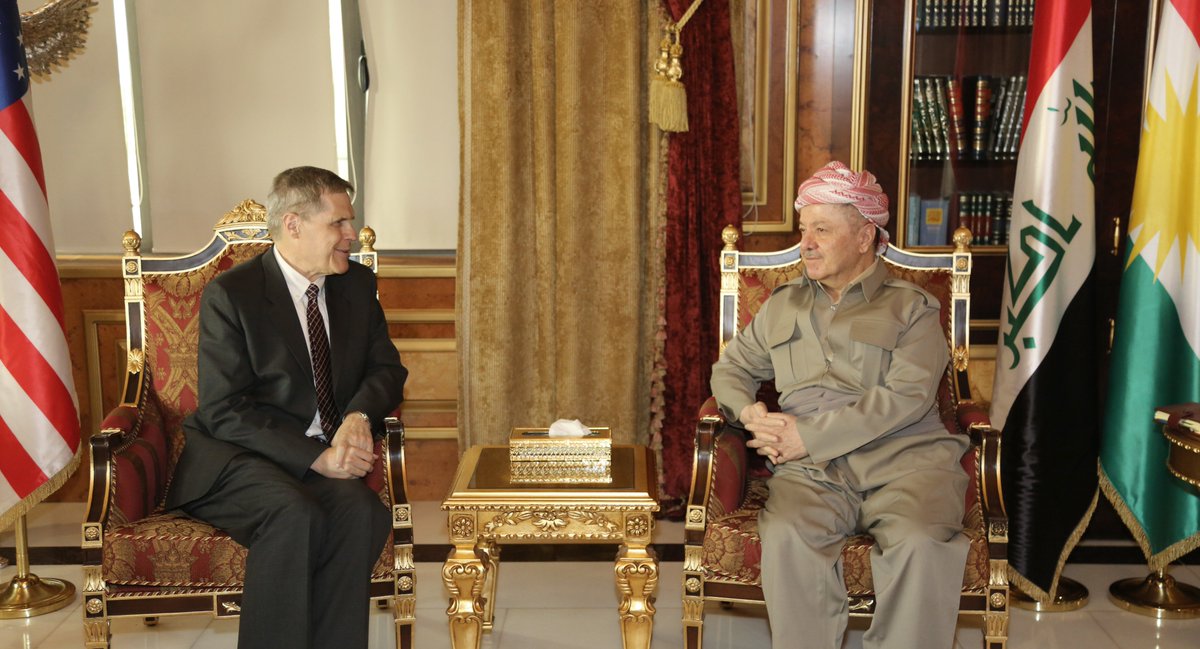
Today, the US Ambassador addressed an issue that pops up every few years. NRT reports:
Recently-arrived US Ambassador to Iraq Matthew Tueller said on Sunday (June 16) that Mosul Dam poses no danger to people and that they will benefit from the water of its reservoir.
Tueller said in a statement that the dam had been repaired by US Army Corps of Engineers and Italian company Trevi to shore up its foundation.
"In this summer, a team from the Iraqi ministry of water resources will be trained on the high-tech equipment at the dam, so as to continue to reconstruct the dam for coming years,” Tueller said during a visit to the dam.
Once the dam’s reservoir reaches sufficient capacity, it will be a resource for drinking water, agriculture and generating electricity, Matthew added.
So let's file that away for when the largest dam in Iraq is again an issue.
Yesterday, Tueller met with the former president of the KRG who remains president of the political party KDP.
Productive meeting with the new United States ambassador to Iraq, Matthew Tueller today at the Barzani Headquarters. We spoke of the latest political developments in the Kurdistan Region and in Iraq.
KURDISTAN 24 notes of Tueller's first visit to the Kurdistan region:
In a separate meeting with Kurdistan Region Prime Minister-designate Masrour Barzani – who also serves as the Chancellor of the Kurdistan Region Security Council (KRSC) – Tueller agreed “to promote more American investment and business-to-business ties” in the Kurdistan Region, once the new KRG cabinet takes office, Masrour Barzani wrote on Twitter.
On Wednesday, the newly-elected President of the Kurdistan Region, Nechirvan Barzani, issued a formal letter calling on Masrour Barzani to form the new KRG cabinet, for which he would have 30 days to complete.
The decree was issued a day after the Kurdistan Parliament named Masrour Barzani to the post of Prime Minister with 87 votes out of 97 lawmakers in attendance.
Meanwhile, here comes summer. Last summer was marked by protests in Iraq. Some of this was due to the lack of electricity during sky rocketing temperatures. AFP notes:
Hospital ventilators shut down, football matches with obligatory water breaks and food spoiling in fridges without power: Iraq’s notorious summer has arrived. As one of the hottest countries in the world with around half of its terrain covered in desert, Iraq is no stranger to stiflingly hot summers.
But even by the country’s own standards, this June has been a sizzler - averaging a daily 48 degrees Celsius, compared to around 40 in previous years.
Across the country, Iraqis have sprung into usual routines to cope: wrapping outside door handles in tape to stop them getting too hot in the sun, keeping a change of clothes in the car, or stepping fully clothed into curbside showers to cool off.
48 degrees Celsius is the equivalent of 118 degrees Fahrenheit. And Suadad al-Salhy (ARAB NEWS) reports:
Mass demonstrations are planned for later this week in the Shiite-dominated southern provinces to protest about the lack of basic daily services including electricity and drinking water, high rates of unemployment and corruption in ministries and government departments, activists told Arab News.
Iranian energy and natural gas imports amount to about 4,000 megawatts per day, equivalent to 20 percent of Iraq’s total production.
The US three-month extension waiver allowing Iraq to import Iranian gas and electricity is expected to dampen some of the anger and give Abdul Mahdi’s government a chance to find more radical solutions to the electricity shortage caused by terrorist actions, lack of planning and government corruption over the past 15-16 years.
People in Basra plan to take to the streets on July 20, activists told Arab News.
“Unemployment, scarcity of electricity and potable water and corruption are all still in place and none have been addressed despite the fact we have been protesting every year,” Sheikh Raied Al-Fraijai, the head of Basra tribal council and one of the Basra’s key activists, told Arab News.
“We will demand the dismissal of Abdul Mahdi and his government,” he said.
Abdul-Mahdi has been an abject failure as prime minister. And it's not just activists who are noticing this fact. RUDAW explains:
Iraq’s Prime Minister Adil Abdul-Mahdi could find himself in hot water after a major Shiite bloc in the Iraqi parliament and the highest Shiite religious authority both launched scathing attacks on his leadership, seven months since he took office.
Commemorating the fifth anniversary of the fatwa that led to the establishment of Shiite paramilitaries Hashd al-Shaabi, the Shiite Marja Ali al-Sistani criticized Abdul-Mahdi over his failure to fill top posts in his cabinet, tackle corruption, and improve public services.
Disputes between Iraq’s parties have left the top jobs at the Ministry of Interior and the Ministry of Defense unfilled, the Marja lamented in his Friday sermon, read by his representative Ahmed al-Safi.
“Corruption still remains rampant in the institutions, and the state hasn’t met that with clear practical steps to limit it and hold those involved accountable,” he said.
“Administrative bureaucracy, lack of employment opportunities, and an acute shortage of essential services, except for some late improvement, cause suffering for the people.”
Tick-tock, Mahdi, tick-tock.


